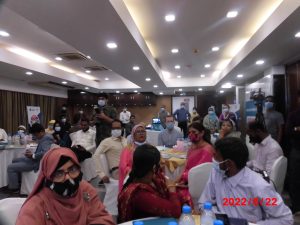Women Empowerment
Women Empowerment Program – SEDAD, Bangladesh At SEDAD (Socio-Economic Development Association for Disabled), we are dedicated to promoting women’s empowerment as a key part of our mission to build an inclusive and equitable society in Bangladesh. Since our establishment in 1992, we have worked to uplift women, particularly those who are disabled, disadvantaged, or living in poverty, by improving their social, economic, and human rights conditions. Our goal is to help women become self-reliant, skilled, and socially included so that they can actively participate in their families, communities, and national development. Through the Women Empowerment Program, we focus on several major objectives. First, we promote economic empowerment by providing livelihood skills training in areas such as sewing, handicrafts, goat rearing, fish culture, and nursery cultivation. These activities help women generate income and achieve financial independence. Second, we emphasize education and capacity building by offering non-formal education, literacy programs, and leadership training that enhance confidence and decision-making abilities. Third, we focus on rights and social inclusion through awareness programs about gender equality, women’s rights, and disability inclusion. We conduct community meetings and advocacy sessions to encourage supportive attitudes among families and local leaders. Fourth, we provide rehabilitation and support for women with disabilities by ensuring access to assistive devices, therapy, counseling, and development opportunities. Finally, we promote group formation and solidarity by organizing women into self-help groups that foster collective action, savings, and social support networks. Our approach combines skill development, awareness building, and inclusive participation. We work closely with local communities, government bodies, and international partners to ensure that women, regardless of their ability or background, can access opportunities for personal and economic growth. Through this program, many women have become financially independent and more confident in their roles within their families and communities. Disabled women have gained dignity, mobility, and social participation, while communities have grown more aware of gender equality and disability rights. Looking ahead, we plan to expand our initiatives by introducing microcredit and entrepreneurship support for women-led enterprises, establishing regional training centers to reach more rural women, and strengthening advocacy networks to protect women’s rights and eliminate gender-based discrimination.





